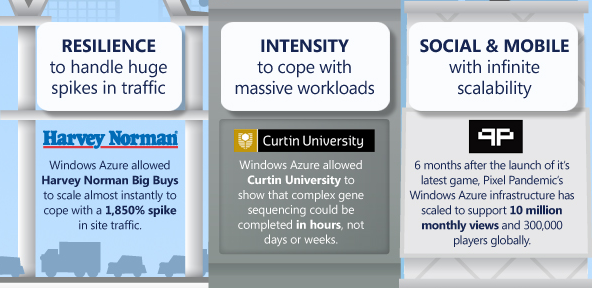Watching any Sochi 2014 coverage this month? You'll be doing so on Azure
http://www.youtube.com/watch?feature=player_embedded&v=NiyMbkNBn30
Over 1000+ hours of live footage covering 98 Winter Olympics events, all being broadcasted over numerous digital and TV avenues -- simultaneously. As an infrastructure geek at heart, and someone who consults clients on their networks, I can't even fathom what kind of backbone is needed to stream a worldwide event like the Olympics. But NBC has fallen back on a familiar face in the cloud arena to make this magic happen: Microsoft.
NBC partnered with YouTube for the 2012 London Olympics and the experience for end users was less than ideal. Robert Cringely had some truthful words about his efforts to catch some footage, and even the NY Times published a scatching piece on the miserable pain that YouTube was putting users through with buffering times. YouTube may be one the most watched video services on the web today, but their secret sauce has traditionally been in handling statically uploaded footage. Live broadcasting is a whole different arena from the little I know about the media arena.
So it's going to be an interesting test for Microsoft's Azure platform this time around. The fact that 50 percent of the Fortune 500 is using Azure is quite reassuring. And I've personally had good things to say about Azure, as my IT consulting company is moving numerous clients to Microsoft's cloud for virtual server needs. Even our internal remote support software, ScreenConnect, is hosted up in Azure and its uptime and reliability is exceptional for my staff.
But the Fortune 500 and my own tribulations with the platform can't replicate what monstrous swathes of viewers will stress the platform with. If you think that the 2014 Winter Olympics will be any different, NBC stated that the 2012 Games saw 219 million viewers, effectively making it the most watched television event in American history.
To be fair, Microsoft isn't the only IT giant to have its fingers in making this all happen. Adobe is providing its expertise in publishing the content and monetization aspects. But Microsoft's IaaS and PaaS services hosted on Azure will be doing most of the "heavy lifting" if you want to call it that. Streaming, transcoding, storage, networking -- all that geeky goodness is being done on Azure. I'm sure Amazon and RackSpace would have loved to land this responsibility, as I can't imagine any better of a case study for a cloud giant to boast about.

Microsoft has touted the reliability and resiliency of Windows Azure for a few years now. But nothing can prepare a platform for the gargantuan traffic spikes that a global event like the Olympics will see. We'll see what Redmond's cloud is really made of over the next half month. If it all goes without a hitch, Microsoft may win over those skeptics who have traditionally turned to Amazon and RackSpace. (Image Source: Andrew Coates)
If you're curious just what kind of horsepower Microsoft is lining up in its court for these Olympics, here's a hint: 10,000 virtual cores. To put that into perspective, most cloud servers we spin up on Azure for our clients are between 2-8 cores in size. Using Microsoft's own figure that each core in the Azure cloud runs at about 1.6GHz, the processing prowess behind 10,000 cores is roughly 16,000GHz. I haven't found out how much memory is being thrown into the IaaS equation, but I'm sure it's just as disgustingly massive in scale.
On the PaaS side, Windows Azure Media Services is the actual engine that is managing and distributing the video feeds for viewing. It isn't surprising, then, that NBC is leveraging the same Azure Media Services offering for a bevy of other outlets such as GolfChannel.com and NBCSports.com. “There are a lot of stakeholders within our ecosystem that depend on this content being delivered at a high-quality rate, to anywhere and any device,” stated Richard Cordella, senior VP and general manager of Digital Media at NBC Sports.
According to Microsoft, the feeds for these Winter Olympics will first flow through NBC's International Broadcast Center in Connecticut (USA) and then get transmitted to two Microsoft datacenters. One is hosted on the US West coast and the other on the East coast. This geo-redundancy will help Microsoft load balance bandwidth needs and also deliver the necessary clustering efforts to leverage groupings of elastic virtual resources.
And not to be left out, a total of 24 other countries like Japan, Canada, and all of Latin America will be getting Olympics streaming upon a custom solution by DeltaTre that is being hosted on Azure. Microsoft is expecting hundreds of millions of viewers to tune into Olympic events from these countries.
If the 2014 Olympics coverage goes off without a hitch on Azure, what will all the skeptics be able to say about cloud viability?
Perhaps this will be the cloud judgement day that proves the naysayers wrong -- for good.
Image Credit: Rido / Shutterstock
 Derrick Wlodarz is an IT Specialist who owns Park Ridge, IL (USA) based technology consulting & service company FireLogic, with over eight+ years of IT experience in the private and public sectors. He holds numerous technical credentials from Microsoft, Google, and CompTIA and specializes in consulting customers on growing hot technologies such as Office 365, Google Apps, cloud-hosted VoIP, among others. Derrick is an active member of CompTIA's Subject Matter Expert Technical Advisory Council that shapes the future of CompTIA exams across the world. You can reach him at derrick at wlodarz dot net.
Derrick Wlodarz is an IT Specialist who owns Park Ridge, IL (USA) based technology consulting & service company FireLogic, with over eight+ years of IT experience in the private and public sectors. He holds numerous technical credentials from Microsoft, Google, and CompTIA and specializes in consulting customers on growing hot technologies such as Office 365, Google Apps, cloud-hosted VoIP, among others. Derrick is an active member of CompTIA's Subject Matter Expert Technical Advisory Council that shapes the future of CompTIA exams across the world. You can reach him at derrick at wlodarz dot net.